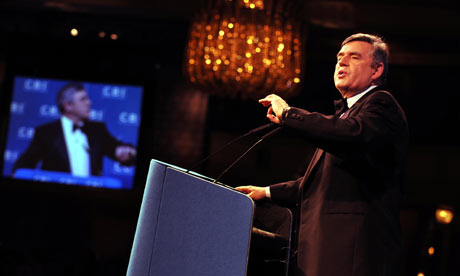CBI attacks 'serious failures' to address debt after fund warns UK recovery still at risk of further shocks Gordon Brown addresses the CBI annual dinner. Photograph: Fiona Hanson/PA The CBI joined forces with the International Monetary Fund tonight to demand tougher action to cut Britain's record budget deficit as the economy recovers from recession. Martin Broughton, president of the employers' organisation, said Whitehall should "focus on delivering key services that are currently mismanaged", slash the £65bn spent on 1,000 quangos and reform public sector pensions. Speaking at the CBI's annual dinner, Broughton said his greatest concern was the government's budget deficit – expected by the Treasury to hit £175bn this year. "The use of heroic growth assumptions, together with a timetable extended to 2018, amounted to a serious failure to address the deficit in a way that gives confidence to buyers of our debt," he said. Gordon Brown – guest of honour at the dinner – said there must be no "complacency" about Britain's economic situation amid ongoing turmoil across the globe. The prime minister said the country still faces "challenging conditions" as he used his "first major intervention on the economy for several weeks" to seek to renew the focus on issues beyond the MPs' expenses scandal. He said he regretted having to raise the top rate of income tax, and that it was not something he or the chancellor had wanted to do, but said that "we have to have a plan for sustainable public finances and included in that must be decisions we made about taxation". Earlier, the Washington-based IMF used its annual health check on the UK economy to praise the government for its "bold and wide ranging" response to the financial crisis but also urged speedier action to bring the public finances back to health once recovery was established. The fund expressed concern that plans announced by Alistair Darling in last month's budget will take eight years to reduce the state's deficit by 6.5% of GDP and called for a "more ambitious" timetable. Despite signs from the CBI's latest snapshot of manufacturing that the pace of industrial decline is abating, the IMF said it was sticking by its forecast that the UK economy would shrink by 4.1% this year and 0.4% in 2010. Darling said that the recession would be over by Christmas and that Britain would start growing modestly again next year. Taking a more downbeat view of the economy's prospects, the fund said that despite recent signs of stability the UK remained susceptible to shocks. "The sharp increase in public-sector borrowing and contingent government liabilities, together with continued financial sector fragility, are significant vulnerabilities. In these circumstances, a severe shock has the potential to disrupt domestic and external stability," the IMF said. Shadow chancellor George Osborne said: "From a body like the IMF, that chooses its words carefully, this is strong stuff. They agree with us that the budget did not set out a credible plan to deal with rising public debt, and they agree with us and the Bank of England that the recovery will be subdued and gradual." Minutes of the May meeting of the Bank's monetary policy committee, released today, said the outlook for growth was "unusually uncertain" and warranted bank rate being left at 0.5% and a £50bn expansion in Threadneedle Street's programme of quantitative easing. "The risks of stimulating demand too little at the current time seemed greater than the risks of stimulating it too much," the minutes said. The Treasury said speedier action to reduce the budget deficit will not be necessary if the economy recovers more quickly than the IMF expects. A spokesman said: "We welcome the IMF's assessment that the UK response to the crisis has been bold and wide-ranging. Restoring the flow of credit in the economy will be crucial to the recovery. "We note the IMF's assessment that developments overseas will continue to affect the economic environment in the UK. Given recent news on further contractions in some of the world's biggest economies, it is vital that countries deliver on the commitments made at G20." Although the IMF would prefer Britain to cut its budget deficit through cuts in public spending rather than tax increases, Robert Chote, director of the Institute for Fiscal Studies, said this would be difficult: "Reasonable estimates of social security and debt interest bills suggest that spending on public services may have to be cut by more than 2% a year in real terms. "Veterans of past Whitehall squeezes fear it will be very difficult to achieve even the spending plans in the budget, let alone more ambitious ones. If they are right, a government wishing to get debt down more quickly may need to rely on tax increases. That is unlikely to be what the Tory backbenches want to hear."Employers join IMF call for government to slash £175bn deficit

Thursday, 21 May 2009
Posted by
Britannia Radio
at
23:38
![]()





















